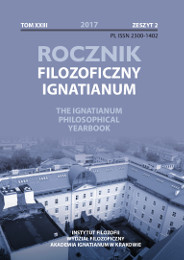Risky anthropic reasoning in cosmology. For or against an evolutional nature of the Universe?
Risky anthropic reasoning in cosmology. For or against an evolutional nature of the Universe?
Author(s): Marek Szydłowski, Paweł TamborSubject(s): Philosophy, Philosophy of Science
Published by: Uniwersytet Ignatianum w Krakowie
Keywords: cosmology; anthropic reasoning; multiverse
Summary/Abstract: In contemporary cosmology, from the creation of the General Theory of Relativity to the second half of the twentieth century, the main task of cosmologists was to construct and test cosmological models of the Universe. Nowadays you will notice that besides these objectives there is a new type of justifying the fact that the observable Universe’s properties are such as they are, and no other. Ways of reasoning called the anthropic explanation are formed, attempting to answer the question: why does the Universe have a nature (properties) necessary for the biological life to come into existence in it? Their objectives are: firstly, an attempt at solving the difficulties of the Standard Cosmological Model, secondly, seeking an explanation of the coincidence of large numbers and the so-called physical constants. The supporters of this kind of explanation are themselves aware of its fundamental weakness: it is neither a causal, nor a nomological explanation; it fails to have the structure of a generalizing explanation, it is alleged to be a tautology. The anthropic principle in cosmology was initially regarded as an observational constrain for cosmological parameters of the standard model of the Universe. However, it can be shown that some consequences of anthropic reasoning are testable, as well as that its explanatory nature is more evident in the specific forms of the theory of explanation.
Journal: Rocznik Filozoficzny Ignatianum
- Issue Year: 23/2017
- Issue No: 2
- Page Range: 7-28
- Page Count: 22
- Language: English

